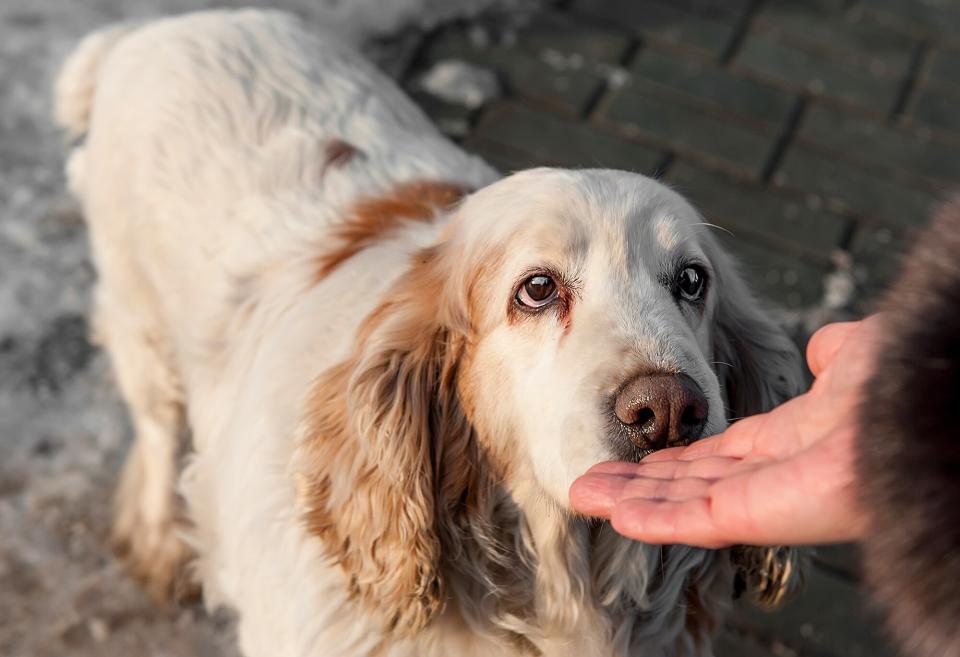Dogs Can Smell When Humans Are Stressed Out, Study Finds

Getty
A dog's nose knows when you're stressed, according to a new study from Queen's University Belfast.
The study, published in the journal PLOS ONE, found that dogs can tell the difference between a stressed human and a calm one by smell.
Researchers discovered this canine skill by presenting dogs with different human sweat and breath samples — some came from individuals who just attempted math problems in front of an audience, and others came from the same group of people before the math challenge. Four of the dogs involved in the study could sniff out the stressed math solver samples, likely picking up the subtle changes stress can have on sweat compounds.
"While it is likely that in a real-life context, dogs are picking up on our stress from a variety of context cues, we have shown using a laboratory study that there is a confirmed odor component that is likely contributing to dogs' ability to sense when we are stressed," animal psychologist Clara Wilson wrote, per NBC News.
Stress has an odour and dogs can smell it - new paper out! In each test session, dogs were given one person’s relaxed and stressed samples, taken only four minutes apart. In 94% of 720 trials, the dogs were able to correctly alert us to the stress sample. https://t.co/a048Gx3lkQ pic.twitter.com/ehBmmyokXn
— Clara Wilson (@ClaraHBWilson) September 28, 2022
RELATED: Ohio Middle School Facility Dog Gets Her Own Adorable Yearbook Photo: 'She Brings Happiness'
In test sessions for the study, researchers presented dogs with samples from humans before they did a math problem and after. The samples were taken just four minutes apart from humans who had to count backward from 9,000, using in units of 17, and who had to do so in front of two researchers. Heart rate and blood pressure measurements were also taken, and participants also filled out questionnaires asking about their stress after the fact.
"If the participant gave a correct answer [to the math question], they were given no feedback and were expected to continue, and if they gave an incorrect answer, the researcher would interrupt with 'no' and tell them their last correct answer," Wilson told CNN.
Establishing that dogs can detect an odour associated with human stress provides deeper knowledge of the human-dog relationship. Confirming an odour component to psychological stress may also raise further discussion into scent based training for PTSD or psychiatric service dogs.
— Clara Wilson (@ClaraHBWilson) September 28, 2022
The test started with 20 dogs, trained to point their noses at the samples, but 16 dogs were removed from the study for different reasons, including lack of attention and boredom. The four remaining dogs were presented with a machine containing an unused piece of gauze, a sample from a stressed person, and one from the same person when unstressed. Remarkably, 96.88 percent of the time, the dogs correctly identified the stressed sample.
Never miss a story — sign up for PEOPLE's free daily newsletter to stay up to date on the best of what PEOPLE has to offer, from juicy celebrity news to compelling human interest stories.
These findings could lead to scent-based training for PTSD service dogs, Wilson shared on Twitter. Researchers could not determine whether the dogs in the study felt empathy toward stressed individuals.
"Because the dogs were trained with positive reinforcement to find their target, they were visibly excited when they found it in the line-up, rather than showing any kind of stress themselves," Wilson said.

Getty
RELATED: Golden Retrievers, Frenchies, and Pugs Saved from Dog Meat Trade Ready for Adoption in the U.S.
Dogs have far more smell receptors than humans, Virginia Tech professor Mark Freeman told CNN, which makes canines "extremely effective at differentiating and identifying odors," he said.
"While we can't know with certainty why dogs developed such keen olfactory senses, it is very probably related with the need to identify prey, potential threats, reproductive status, and familial relationships in a pack setting, among others," Freeman, who was not involved in the study, said.

 Yahoo Finance
Yahoo Finance 